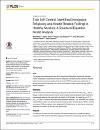Trait self-control, identified-introjected religiosity and health-related-feelings in healthy Muslims: A structural equation model analysis

عرض / فتح
التاريخ
2015-05المؤلف
Briki, WalidAloui, Asma
Bragazzi, Nicola Luigi
Chaouachi, Anis
Patrick, Thomas
Chamari, Karim
...show more authors ...show less authors
البيانات الوصفية
عرض كامل للتسجيلةالملخص
Aim: The present study attempted to test McCullough and Willoughby’s hypothesis that self-control mediates the relationships between religiosity and psychosocial outcomes. Specifically, this study examined whether trait self-control (TSC) mediates the relationship of identified-introjected religiosity with positive and negative health-related-feelings (HRF) in healthy Muslims.
Methods: Two hundred eleven French-speaking participants (116 females, 95 males; Mage = 28.15, SDage = 6.90) answered questionnaires. One hundred ninety participants were retained for the analyses because they reported to be healthy (105 females, 85 males; Mage = 27.72, SDage = 6.80). To examine the relationships between religiosity, TSC and HRF, two competing mediation models were tested using structural equation model analysis: While a starting model used TSC as mediator of the religiosity-HRF relationship, an alternative model used religiosity as mediator of the TSC-HRF relationship.
Results: The findings revealed that TSC mediated the relationship between identified religiosity and positive HRF, and that identified religiosity mediated the relationship between TSC and positive and negative HRF, thereby validating both models. Moreover, the comparison of both models showed that the starting model explained 13.211% of the variance (goodness of fit = 1.000), whereas the alternative model explained 6.877% of the variance (goodness of fit = 0.987).
Conclusion:These results show that the starting model is the most effective model to account for the relationships between religiosity, TSC, and HRF. Therefore, this study provides initial insights into how religiosity influences psychological health through TSC. Important practical implications for the religious education are suggested.
المجموعات
- العلوم الاجتماعية [101 items ]

